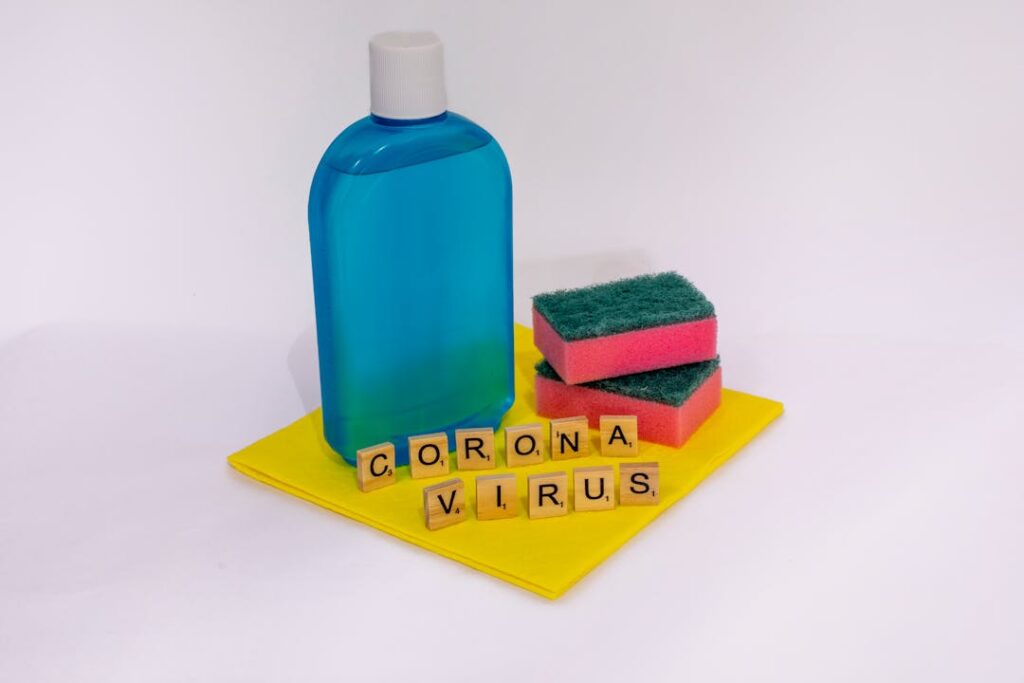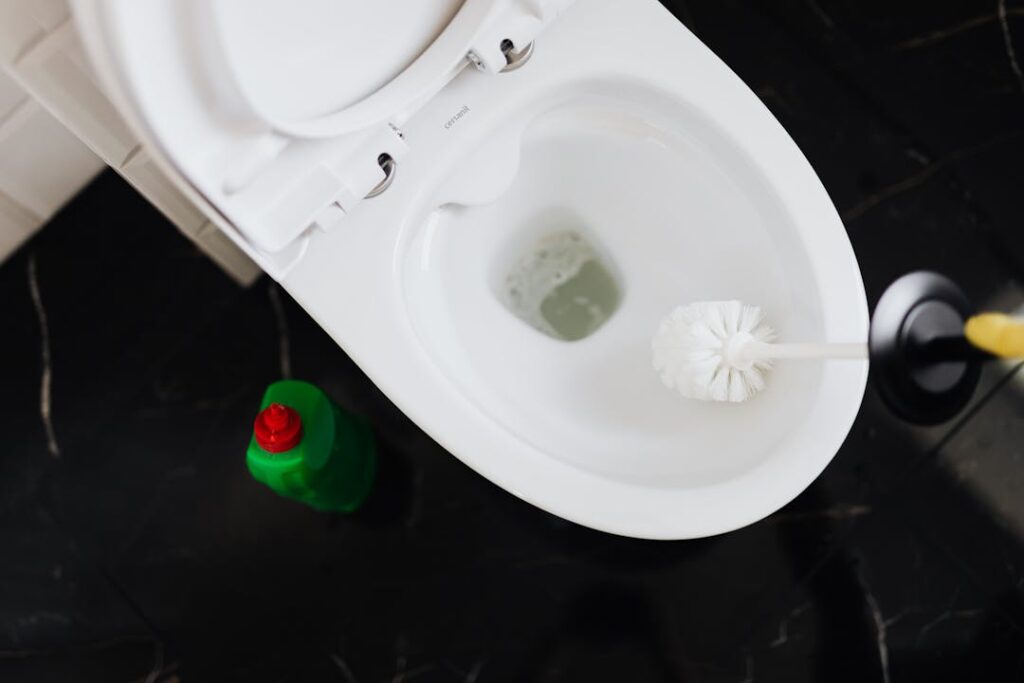Let us face it; our world is full of countless cleaning products, making it easy to overlook one of the most powerful cleaning solutions glaring at us in our pantries: vinegar.
This versatile and natural cleaning agent can effectively tackle various household cleaning tasks. Its acidic properties make it a powerful and eco-friendly alternative to chemical cleaners.
But first, let us demystify one misconception.
Vinegar, a staple in many kitchens, is for more than simple cooking and salad dressings. In fact, it’s a great cleaning agent that can tackle various household tasks.
In other words, we will show you how vinegar can be your secret weapon for cleaning everything from kitchen appliances and countertops to bathroom fixtures like sinks and bathtubs.
Through its natural acidity, vinegar effectively cuts through grease, removes stains, and even eliminates odors.
So buckle up as we explore this wonder cleaning solution together.

Benefits of Vinegar for Cleaning
Using vinegar as a cleaning agent offers several benefits:
To begin with, vinegar is both non-toxic and biodegradable. How awesome is that?
As a result, being eco-friendly makes it safe for the environment and your family, particularly where there are children and pets.
And the cost? Compared to commercial cleaners, vinegar is inexpensive and readily available. And on top of that, most kitchens readily have it in the pantry.
The second benefit of using vinegar as a cleaning solution is its versatility. As explained below, it can effectively clean many surfaces and materials, saving you the expense of using varied cleaning agents.
Do you have unpleasant odors in the house?
Worry not. Vinegar is the solution to this problem. It will effectively neutralize the bad smell. You can use it on surfaces most likely to produce an unwelcome odor, like trash cans, sinks, and refrigerators.
In addition, it breaks down stains and mineral deposits on surfaces such as glass, tile, and stainless steel. It also cuts through grease and grime, making it useful for cleaning kitchen appliances, stovetops, and range hoods.
Besides, its acidity helps inhibit the growth of mold and mildew, making it suitable for cleaning bathrooms and humid areas. Even more, you can still use it on wood, tile, laminate, and porcelain.
Then, if you care about your laundry, adding vinegar to the rinse cycle can soften clothes and remove detergent residue.
Last, vinegar has antibacterial properties. Its acidity helps kill bacteria and germs hovering in your home.
Types of Vinegar
Vinegar comes in many types, each with its unique flavor profile and uses, and here we’ll, in brief, explore the most common.
White Vinegar
It is made from distilled grain alcohol and is ideal for general cleaning tasks. It has a very strong, sharp, and acidic profile.
Besides cleaning and pickling, you can still use it in some cooking recipes where a strong acidic taste is desired.
Apple Cider Vinegar
Made from fermented apple juice, it offers a milder scent and you can use it for specific cleaning.
Apple cider vinegar is also used for salad dressings, marinades, health tonics, and beauty treatments.
Balsamic Vinegar
This one is made from reduced grape must (freshly crushed grape juice with all the skins, seeds, and stems).
Mostly used in culinary applications (such as salad dressings, drizzling over fruits and vegetables, and gourmet cooking), it is less commonly used in cleaning.
Flavor Profile: sweet, complex, and rich with a slight tang.
Red Wine Vinegar
Description: Made from fermented red wine.
Flavor Profile: Robust and tangy, with a hint of red wine flavor.
Uses: Salad dressings, marinades, and reduction sauces.
White Wine Vinegar
Description: Made from fermented white wine.
Flavor Profile: Mild and less acidic than red wine vinegar.
Uses: Salad dressings, sauces, and pickling.
Others
The other common kinds of vinegar (and they derive their names from the source) include rice vinegar, malt, sherry, champagne, coconut, honey, pineapple, and cane vinegar.
Each type of vinegar has its unique characteristics, making it suitable for different culinary and non-culinary purposes.
Whether you’re looking to enhance the flavor of your dishes or seeking a natural cleaning agent, there’s a vinegar type that fits your needs perfectly.
Places to Use Vinegar Effectively as a Cleaning Solution
Here’s a summarized rundown of places to use vinegar as a cleaning solution:
Kitchen
- Countertops: Wipe countertops with a solution of vinegar and water to disinfect and remove tough stains and odors of vinegar
- Microwave: Heat a bowl of vinegar to steam-clean and deodorize the microwave.
- Refrigerator: Clean and deodorize shelves and drawers by wiping them with vinegar.
Bathroom
- Showerheads: Soak showerheads in vinegar to remove mineral deposits.
- Toilet: Pour vinegar into the toilet bowl and let it sit before scrubbing and flushing for a sparkling clean bowl.
- Tiles and Grout: Use vinegar to clean and whiten tiles and grout lines.

Laundry
- Fabric Softener: Add vinegar to the rinse cycle to soften clothes and remove odors.
- Stain Removal: Treat stains with a mixture of vinegar and water before washing.
Living Areas
- Glass and Mirrors: Clean glass surfaces, windows, and mirrors with a vinegar-water solution for streak-free results.
- Wood Furniture: Remove water stains from wood furniture by rubbing with a cloth dampened with vinegar.
- Carpet Stains: Blot carpet stains with vinegar solvents to lift and neutralize odors.
Tips for Buying and Storing Vinegar
I’m sure the various types of vinegar can confuse you as you decide which to buy.
Therefore, use the below guidelines:
- Quality Matters: Choose high-quality vinegar (that is not so cheap).
- Storage: Store vinegar in a cool, dark place to maintain its potency. Most vinegars have an indefinite shelf life but likely lose some acidity and flavor over time.
- Organic Options: If you are concerned about pesticides and additives, opt for organic vinegar.
Tips for Cleaning With Vinegar Safely
Now that you know the benefits, types, storage tips, and places to clean using vinegar, let’s look at the tips on how to use vinegar:
- Dilution: Always dilute vinegar with water for cleaning to avoid damaging surfaces.
- Ventilation: Ensure proper ventilation when using vinegar, especially in enclosed spaces.
- Testing: Test vinegar on a small, inconspicuous area before applying it to larger surfaces.
- Avoid Mixing with Bleach: Never mix vinegar with bleach or ammonia, as it can produce harmful fumes.
- Wear protective clothing like musk and gloves when cleaning with vinegar for your safety.

Final Thoughts on Using Vinegar as a Cleaning Solution
In summary, you can trust vinegar to do the job, whether you’re looking to freshen up your home, tackle tough stains, or even repel pests.
Harness its power as a natural and effective cleaning solution for the home. With its versatility and benefits, vinegar can become a staple in your cleaning arsenal, providing a safe and eco-friendly way to maintain a clean and healthy living environment.
Overall, vinegar’s cleaning properties, with its safety and affordability, make it a popular choice for eco-conscious and budget-conscious consumers looking for effective household cleaners.
Have you ever tried using vinegar for cleaning? What are your thoughts? Please share. If you need a partner to clean your home, call us.
FAQs
Here are five frequently asked questions (FAQs) about using vinegar as a powerful cleaning solution:
Is vinegar safe to use on all surfaces?
Vinegar is safe on many surfaces, like countertops, glass, and tiles. However, it’s essential to test it on a small area in the first place, especially on delicate surfaces like marble or granite, to ensure it doesn’t cause any damage.
Does vinegar leave a strong odor after cleaning?
While vinegar has a distinct smell, it dissipates quickly once it dries. You can conceal the odor by adding a few drops of essential oil like lemon or lavender to the vinegar solution, leaving a pleasant scent.
Can I use vinegar to clean electronics?
We do not recommend using vinegar directly on electronics, as its acidity can damage sensitive components. Instead, use a microfiber cloth lightly dampened with water to wipe electronic devices.
Is vinegar effective against mold and mildew?
Sure! Vinegar’s acidic nature effectively kills mold and mildew. Spray undiluted vinegar on affected areas, let it sit for a few hours, then scrub and rinse thoroughly.
Can I mix vinegar with other cleaning agents?
It’s best to avoid mixing vinegar with bleach or ammonia, as it can produce harmful fumes. Stick to using vinegar as a standalone cleaner or in combination with water and mild dish soap for added cleaning power.
[…] mild dish soap mixed with water or a solution of vinegar and water for effective spot […]